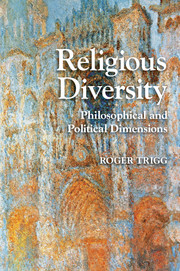Book contents
- Frontmatter
- Dedication
- Contents
- Introduction
- 1 The Challenge of Religious Diversity
- 2 Do Religions Claim Truth?
- 3 Religious Pluralism
- 4 The Roots of Religious Belief
- 5 Does Disagreement Undermine Theism?
- 6 Education and Religious Diversity
- 7 Truth and Coercion
- 8 Religious Diversity and Identity
- 9 Religion as Personal Preference
- 10 Freedom and Religion
- Bibliography
- Index
- References
10 - Freedom and Religion
Published online by Cambridge University Press: 05 June 2014
- Frontmatter
- Dedication
- Contents
- Introduction
- 1 The Challenge of Religious Diversity
- 2 Do Religions Claim Truth?
- 3 Religious Pluralism
- 4 The Roots of Religious Belief
- 5 Does Disagreement Undermine Theism?
- 6 Education and Religious Diversity
- 7 Truth and Coercion
- 8 Religious Diversity and Identity
- 9 Religion as Personal Preference
- 10 Freedom and Religion
- Bibliography
- Index
- References
Summary
IS RELIGION SPECIAL?
Should secularists give any special regard to religious views? They are probably glad to see them as personal preferences, to be ranked in democratic society alongside other preferences. Writing from a Canadian perspective, the eminent philosopher and social theorist Charles Taylor argues with a colleague that “respect for the moral equality of individuals and the protection of freedom of conscience and religion” constitute the two major aims of their version of secularism. In other words, secularism ought to have a more positive attitude to the protection of a religious conscience than sometimes seems to be the case. Taylor and Maclure hold up the model of a political society that agrees about basic political principles so we can live together and resolve disputes while accepting differences. They insist the model includes “respect for the plurality of philosophical, religious and moral perspectives adopted by citizens.”
Democracy is necessary because of the existence of disagreement, and it needs to respect and, indeed, nourish alternative points of view. There may be different conceptions of a good society, but even if one prevails, others must not be extinguished. That would soon mean the end of democracy. In any democracy, there have to be organized oppositions to government, with opposition parties, which could themselves offer a plausible alternative. The same goes for any moral or other outlook. We are not omniscient, and we cannot afford to drive away all the views with which we disagree.
- Type
- Chapter
- Information
- Religious DiversityPhilosophical and Political Dimensions, pp. 169 - 188Publisher: Cambridge University PressPrint publication year: 2014

